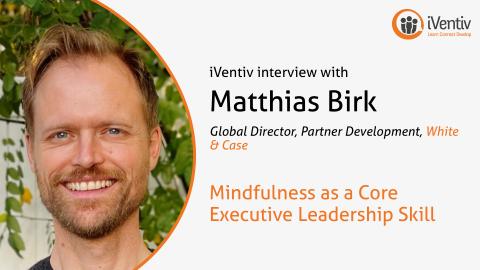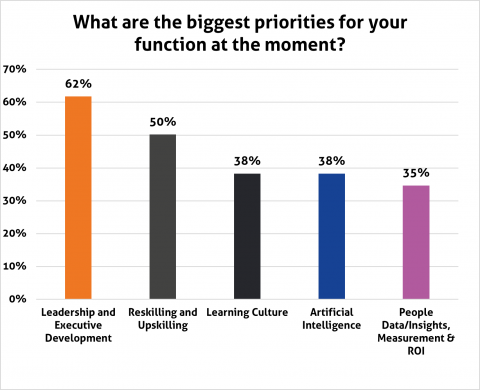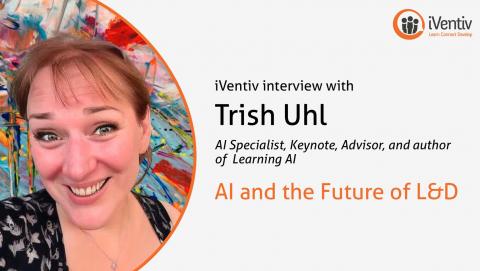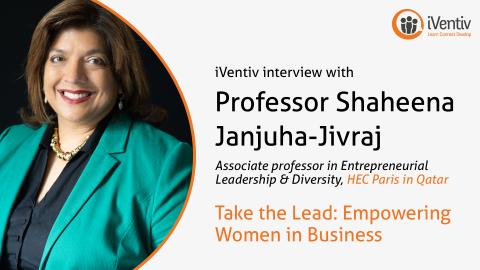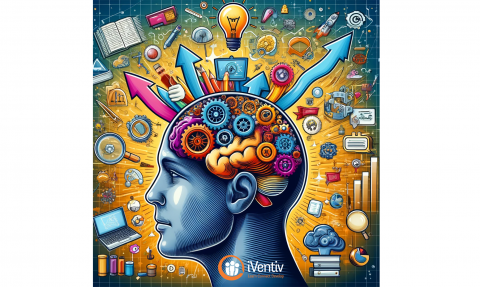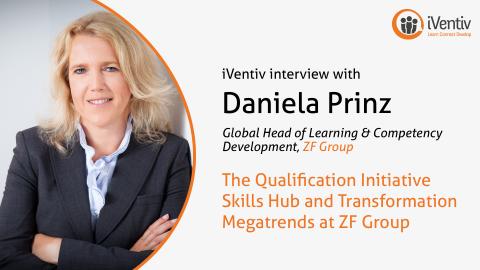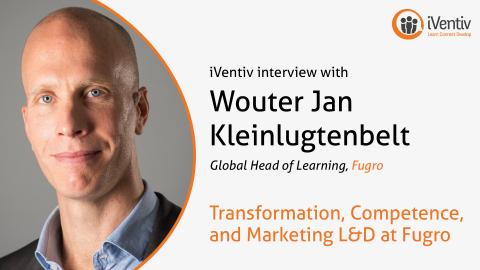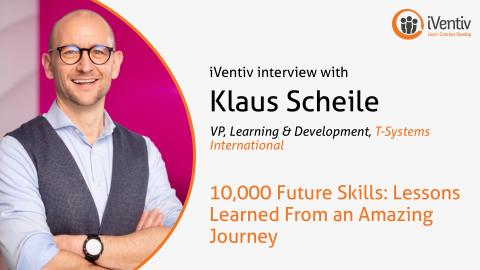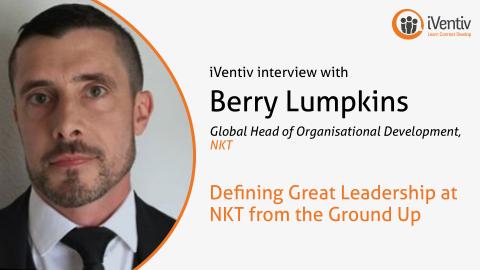Ahead of his session on hybrid working and exclusivity at iVentiv's Learning Futures California later this year, Uli Heitzlhofer, Director of People Learning & Development at Lyft, gave a preview of the topics he plans to cover in a short interview with iVentiv.
Uli discussed the pivot to a hybrid model of work and the opportunities and challenges that presents for leadership, for new employees, and for the business.
Does hybrid work for everyone?
Uli starts by talking about how Lyft transitioned to hybrid working. "We decided to actually go fully flexible in terms of where people are working from," he explains, "and that has been landing tremendously positively with people at Lyft."
But getting there wasn't easy, he goes on to say. "Similar to many other companies, pre-pandemic it was absolutely normal to go into the office. We have probably the vast majority, 90-95 percent of people, who would do that Monday through Friday."
With so many workers needing office facilities to support drivers, about 50% of the Lyft workforce continued to go in throughout the pandemic. But for those working from home, there were understandable concerns about productivity and innovation. As it turned out, they need not have worried so much.
"It makes sense, if you have people come to the office, you see them" he says, speaking about the concerns that business leaders often have. "This person is here, oh this person is here at 6pm or at 8pm, that person must be really productive!”
The key aspect, Uli thinks, is trust. Leaders want to know that they can trust their teams to be productive. "If I think about some of the organizations that are out there doing the very opposite, I assume that it's because they're just not trusting their organization. They're not trusting their people. They force them to come back to the office because that allows them to control them. Did you badge in? Did you do this? We can kind of monitor."
Is it right to monitor your employees when they work from home?
"Software that is monitoring employees has skyrocketed over the past two years," Uli reflects. Some leaders worry that "if they're not here [in the office] then how do we check whether or not they're actually performing?"
Uli is in no doubt about whether that's going to work. "I think all of that is the wrong way to go. There's no need to monitor day by day, minute by minute, rather what you should all invest in is managers."
If your managers are "in a position where they can properly set measurable goals" then they can determine what success looks like. "Now that we are in this fully remote space, it is a little bit more important to say what are the things that I'm expecting of you? If you deliver them, I'm good with that, we are okay. If that takes you 20 hours, 80 hours, that's on you. You just need to deliver that and then we can talk about workload and making sure they're not overcapacity."
What do employees want from hybrid working?
When Uli and his team surveyed Lyft employees, it showed pretty clearly that people who weren't offered flexibility were much more likely to leave. "People are way less engaged if they are forced to come back to the office." To retain people, it was vital to counter that threat.
How do you do that? "Listen to your people and give them what they ask for, while at the same time making sure that they are continuing to be productive and innovative as they go about it."
When you offer people flexibility, therefore, Uli advises that you "set clear targets and goals to ensure that there are measurable opportunities in place." Are you delivering? Are you delivering what we hope you want to do and need to do?
At the same time, he says, make sure you create opportunities to come together "for moments that matter." With a dispersed workforce, you need to "drive connections to the organization, connection to the business, connection to other people."
"We've heard this loud and clear," Uli explains, "if you never have a connection to the organization, you do not walk in a physical space, you have very little loyalty, you have very little connection, and that is really bad for engagement, and it's really bad for retention."
So yes, coming to the office is still important, but as Uli puts it: "We don't need to do it Monday through Friday, every day, that is exactly the opposite of what people are asking for."
Does hybrid working support inclusivity and diversity?
Lyft's major hubs are located in San Francisco, Nashville, New York, and Seattle. Those hubs are rich in tech talent but, as Uli notes, "not necessarily the most diverse talent."
"The shift towards a fully flexible work arrangement," he goes on, "allowed us to say it doesn't matter where you are, we want you based on what you can deliver, and that allowed us to tap into a way more diverse open market."
But beware proximity bias. "If we know that the people who will not come to the office because they are working permanently remote from somewhere else is the most diverse population, well then it's going to be an easy calculation to say the next time we do a performance assessment, or we're thinking about promotion readiness, or we're thinking about what big project am I going to give to somebody, biases are creeping in."
That's where the threat to diversity comes in. If you don't address proximity bias, and the less diverse talent is able to come to the office more often because they live near one of your central hubs, then it will be the less diverse group that gets the bigger projects, the higher ratings, and the higher promotion rates.
The solution? Again, the answer is managers. If managers set "clear targets and goals and do that for every one of their direct reports in an equal manner, it shouldn't matter who they are."
How do team norms help you avoid bias?
Uli suggests using team norms to help shape your culture in an inclusive way. "The question that we asked ourselves is what if the manager of a team, the leader of a team, were to leave the team. Do the norms reside with the leader? Do the norms reside with the team?"
The answer for Lyft was that the norms reside with the team. That means "a leader can come in and has a document in front of them that determines how this team operates at the moment. If you want to ramp up quickly as a leader, read through the doc, and just follow what's in there, and you'll probably be able to very quickly run with the team."
With that base of understanding, a manager can focus on shifting those areas that need shifting. "We have this vision as to where we want to go," Uli reflects. "At the same time, we also know that there are economics and there are dynamics at play that we need to just listen to and understand how this is impacting the business and how is it therefore impacting us as individuals."
What are the other advantages of hybrid working?
One of the other big advantages of hybrid working, Uli notes, is reduced costs. The traditional office "is a high cost, it’s the place that you need to rent or buy and pay off, you have individuals who need to come and clean you have potentially food, snacks, drinks, it's a huge cost center."
That means if you have flexibility in terms of where people work, "you may also easily then reduce the office space and thereby save money and find ways of how you can invest in other technology." There's great software out there, says Uli, "where you have an opportunity to collaborate in a virtual setting and yet do brainstorms, do voting, do prioritization work. It can all happen virtually. It's just about getting people to be capable of doing these activities virtually."
With that in mind, if you can get your managers to be great facilitators, you have an enormous advantage. This is bread and butter for L&D, but "what if every manager, every team lead, everybody who has some responsibility, of bringing people together to drive some agenda? What if all of them were the best possible facilitators? What if they were all as good as our best facilitator on the team, on the learning and development team? What could you accomplish and achieve with that?"
At Lyft, Uli and his team have started working towards that goal already. Teaching the skills, teaching the software. That way, the innovation you're so keen to develop starts to happen.
Uli Heitzlhofer is Director of People Learning & Development at Lyft and a member of the iVentiv Advisory Board. Uli will be facilitating a session around hybrid working and exclusivity at iVentiv's Learning Futures California in August 2022 and registration is free for Chief Learning Officers or equivalent.
Uli started his career as an HR Generalist. In 2011, he joined Google as Performance Management Program Manager. Recognizing his passion for L&D, he joined Google’s Executive Development team in 2013. Over the next 1½ years, he learned the in’s and out’s of learning programs before shifting focus to a global scale by joining Google’s Manager Development team, targeting experienced managers. After 6½ years at Google, Uli joined Lyft as Head of People Learning & Development. Since then, Uli redesigned Lyft’s Performance Management system, overhauled the entire L&D portfolio and placed People Development on the company-wide agenda. Current top initiatives revolve around topics such as setting us up for success regarding our new flexible work policy, boosting internal mobility and building out a holistic talent management strategy.

